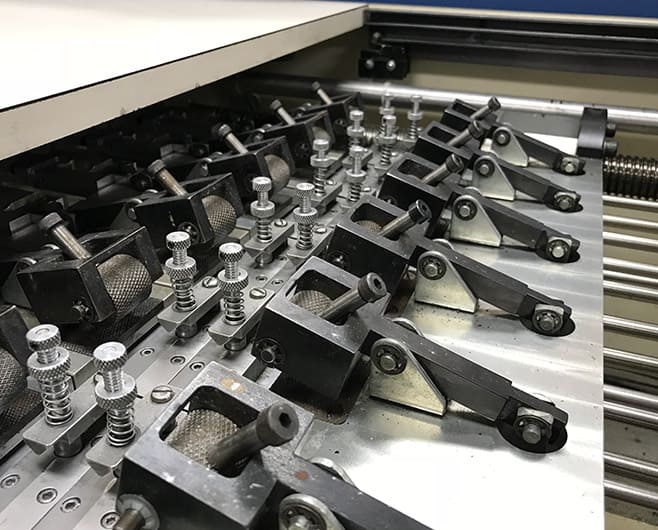
Physical Testing for Industrial Applications
Physical testing your polymer materials is an essential step in ensuring the end product’s readiness for industrial applications. Physical testing is the best way to find out how your material will perform for the end user.
But what is physical testing? In polymer engineering, a physical test is any test that measures the physical characteristics of a material. These physical characteristics can include strength, flexibility, specific gravity, density, and more.
Some of the most popular physical testing methods include adhesion testing, tension testing, specific gravity testing, and electrical testing.
At ACE Laboratories, our expert engineers will work with you to decide which physical tests are appropriate for your material and its end use.
Low Temperature Testing
Does your end product need to perform at low temperatures? If so, low temperature testing is likely an important tool for the screening and development of your material.
Our first test is ASTM D1329. This method of testing quickly and consistently evaluates both the viscoelastic properties of rubber and the effects of crystallization at low temperatures. This cold testing will be especially pertinent for products that need to maintain their adhesive strength and flexibility at low temperatures.
We commonly provide TR70 and TR10 data points for ASTM D1329. You will receive data and recommendations related to your product’s low-temperature compression set and brittleness points.
Test results from two additional adhesion tests, ASTM D746 and D2137 are often used for comparative research and development purposes, as well as compliance testing. These tests examine the low-temperature flexibility of your sample material through impact.
For research and development purposes, ASTM D746 AND D2137 determine the lowest temperature at which your sample can be expected to perform.
Compliance testing consists of a simple “Pass/Fail” test at a given temperature.
Tension Testing
Tension testing is used to evaluate the tensile properties of thermoplastic elastomers and vulcanized thermoset rubbers.
Thermoplastic elastomers, common in the automotive and household appliances sectors, are mixes of polymers that exhibit both thermoplastic and elastomeric properties. They are highly flexible, and return to nearly their original shapes after stretching, resulting in an excellent lifespan and physical range.
Vulcanized thermoset rubbers are similar to thermoplastic elastomers, with differing cross-linking bonds in their structure. Vulcanized thermoset rubbers tend to be more chemically resistant, thermally stable, and creep/set resistant than thermoplastic elastomers.
Testing the tensile properties of these rubbers is extremely important for meeting industrial standards and excelling in industrial applications. While tensile properties are simple, testing them is one of the most vital ways to determine whether or not a material is suitable for its end application.
At ACE, we use the ASTM D412 standard to test all commonly referenced tensile and elongation properties, such as yield strength and rebound resistance. On top of the common properties, we also test several other areas, including Tensile Set.
To test Tensile Set, we elongate a material, hold for a predetermined amount of time, and then allow the material to retract after release. These tests are critical in evaluating plastic deformation and preventing permanent deformation for the end user.
Our rubber process analyzer and rebound resilience tests are also important to consider when evaluating flexibility, strength, and tensile properties.
Specific Gravity Testing
What is specific gravity?
Most simply put, specific gravity measures the ratio of the density of a mass to an equal volume of deionized water. The measurement is taken at 23 degrees Celsius.
Specific gravity measurements are important to consider when determining production and manufacturing costs. Since plastics are typically sold at a cost-per-pound price, a lower density—or lower specific gravity—means there will be more volume of material per pound.
Using ASTM D297, ACE can identify specific rubber polymers that are present in your rubber product with specific gravity testing.
This testing standard uses the hydrostatic method to determine specific gravity.
You can use knowledge about your material’s specific gravity to compare materials in a concrete way. You may also want to consider comparing theoretical properties to actual properties in order to evaluate mix quality and identify possible processing concerns.
Electrical Testing
Electrical testing is important because it allows us to ensure the safety of a material’s end users. Of course, this is especially true for materials that are guaranteed or even likely to come into contact with electrical charges, like insulators and wire cables.
It is important that electricity can move safely through a material and across its surfaces. To know this, we must understand the way an electrical charge interacts with your material.
ACE uses ASTM D991 to predict the safety, static change, and current transmission of a material in application.
We also use ASTM D257 to quickly check your material’s volume resistivity and surface conductivity by using a closed ring system.
Let’s See What Your Material Can Do
Whether you’re working with a rubber compound or other material for industrial use, ACE wants to meet your challenges head-on.
Contact us to make a physical testing plan for your material today—let’s see how great your end product can be.
In the news
A Guide to Cool Roof Systems
What Is a Cool Roof System? Traditionally, commercial and residential buildings alike have roofs made from dark materials, such as shingles and tiles. Dark roofing materials absorb more heat than lighter materials, and that heat is transferred to the building, which...
What Is FDA CFR 21 177.2600 and How Can I be Compliant?
The consumer goods industry is highly regulated, especially regarding food safety. If you’re making any kind of rubber or polymer part for machines that process food, you need to understand and comply with the FDA’s 21 CFR 177.2600 regulations. This standard is often...
